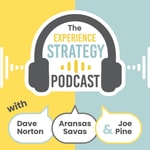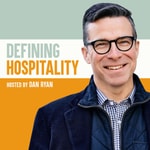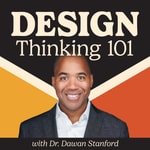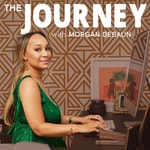The Experience Strategy Podcast – Détails, épisodes et analyse
Détails du podcast
Informations techniques et générales issues du flux RSS du podcast.

The Experience Strategy Podcast
Dave Norton, Aransas Savas, and Joe Pine
Fréquence : 1 épisode/14j. Total Éps: 108

Classements récents
Dernières positions dans les classements Apple Podcasts et Spotify.
Apple Podcasts
🇨🇦 Canada - management
19/07/2025#87
Spotify
Aucun classement récent disponible
Liens partagés entre épisodes et podcasts
Liens présents dans les descriptions d'épisodes et autres podcasts les utilisant également.
See all- https://substackcdn.com/image/fetch/f_auto
247 partages
- http://attractionpros.com/
67 partages
- https://www.baesystems.com/en/home
66 partages
- https://www.instagram.com/zibbyowens
427 partages
- https://www.instagram.com/thetoogoodlife
2 partages
- https://www.instagram.com/getstix
1 partage
Qualité et score du flux RSS
Évaluation technique de la qualité et de la structure du flux RSS.
See allScore global : 42%
Historique des publications
Répartition mensuelle des publications d'épisodes au fil des années.
The New Profit Model in Sports: The Atlanta Braves' Experience Strategy
jeudi 17 juillet 2025 • Durée 24:39
In this episode of the Experience Strategy Podcast, hosts Aransas Savas, Joe Pine, and Dave Norton discuss the economic power of experience strategy in various industries, focusing on an article in the Wall Street Journal on the Atlanta Braves and their innovative approach to sports business through the Battery Atlanta. They explore the concept of Disneyfication, where businesses create holistic experiences that enhance customer engagement and economic impact. The conversation also delves into the potential for reimagining healthcare facilities as experience-driven environments, emphasizing the interconnectedness of experiences, goods, and services in today's economy.
Takeaways
- The Atlanta Braves have revolutionized the sports business model through experience strategy.
- Experience economy prioritizes experiences over goods and services.
- The Battery Atlanta serves as a model for mixed-use development.
- Sports venues can act as anchors for surrounding retail and experiences.
- Disneyfication is a viable strategy for various industries.
- Healthcare can be transformed into experience-driven environments.
- Cities can become experience hubs to attract tourism and business.
- The economic impact of sports venues extends beyond ticket sales.
- Creating holistic experiences can lead to community engagement and economic growth.
- The experience economy is reshaping consumer preferences and business strategies.
Chapters
00:00 Introduction to the Experience Economy Podcast
02:11 The Atlanta Braves: A Case Study in Experience Strategy
12:47 Disneyfication: Transforming Industries through Experience
15:14 Reimagining Healthcare and Other Industries: The Disneyfication of Everything
20:31 The Interconnectedness of Experiences, Goods, and Services
Read More:
https://www.wsj.com/sports/baseball/truist-park-battery-atlanta-a3698b69?mod=Searchresults_pos1&page=1
Register for a free pilot program with Feedback Now
https://marketing-info.feedbacknow.com/free-pilot
Learn more about Stone Mantel
https://www.stonemantel.co
Sign up for the Experience Strategist Substack here:
https://theexperiencestrategist.substack.comWhat Integration Therapies in Silicon Valley Have to Do with the Transformation Economy
jeudi 10 juillet 2025 • Durée 27:43
In this episode, we dive into the intriguing world of integration therapies within Silicon Valley's tech culture. Inspired by a Wall Street Journal article, we discuss how psychedelics are becoming mainstream among tech workers, leading to the rise of integration therapists. These professionals help individuals process their experiences with substances like ayahuasca and psilocybin, aiming to combat burnout and unlock creativity. We explore the therapeutic potential and unintended consequences of this trend, including the phenomenon of workers leaving the industry after profound experiences.
Takeaways
- Psychedelics are becoming mainstream in Silicon Valley.
- Integration therapy is essential for processing psychedelic experiences.
- Many tech workers face existential crises after psychedelic use.
- Therapeutic use of psychedelics is viewed positively by some.
- Reflection is crucial for meaningful transformation.
- Journaling can enhance personal agency and clarity.
- Travel can provide new perspectives for personal growth.
- Integration helps sustain the benefits of transformative experiences.
- Companies can benefit from encouraging reflection among employees.
- The conversation around psychedelics is evolving and complex.
Chapters
00:00 Introduction to Psychedelics in Silicon Valley
02:09 The Role of Integration Therapies
05:57 Therapeutic Uses of Psychedelics
09:57 Moral Perspectives on Psychedelics
14:10 Transporting vs. Transformative Experiences
18:20 The Power of Journaling and Reflection
21:44 Encapsulation and Integration in Transformation
23:57 Conclusion and Reflections on the Discussion
Read More:
https://www.wsj.com/lifestyle/so-you-took-ayahuasca-the-therapist-will-see-you-now-eee7476b?st=8GRcX3&reflink=desktopwebshare_permalink
Register for a free pilot program with Feedback Now
https://marketing-info.feedbacknow.com/free-pilot
Learn more about Stone Mantel
https://www.stonemantel.co
Sign up for the Experience Strategist Substack here:
https://theexperiencestrategist.substack.comCracker Barrel is in the Wall Street Journal | May 6, 2025
mardi 6 mai 2025 • Durée 20:58
In this episode of the Experience Strategy Podcast, hosts Joe Pine, Aransas Savas, and Dave Norton discuss the Wall Street Journal article about Cracker Barrel's recent transformation efforts aimed at attracting younger customers while retaining their core base. They explore the challenges and opportunities of modernizing a legacy brand, emphasizing the importance of experience strategy over mere aesthetic changes. The conversation highlights the role of employees in successful transformations, the impact of economic factors on customer behavior, and innovative ideas for enhancing the dining experience.
- Cracker Barrel is attempting to modernize while retaining its nostalgic appeal.
- Transformations often fail when they ignore the core customer base.
- Experience should lead brand decisions, not the other way around.
- Employee involvement is crucial for successful transformations.
- Economic changes can create opportunities for brands like Cracker Barrel.
- Experience strategy can be a powerful tool in attracting customers.
- Innovative dining experiences can differentiate a brand.
- Understanding customer needs is essential for effective transformation.
- Merchandising strategies can enhance the overall experience.
Chapters
00:00 Introduction to Experience Strategy Podcast
01:05 Cracker Barrel's Transformation Journey
04:05 Understanding Cracker Barrel's Nostalgia and Experience
08:10 The Role of Aesthetics in Experience
10:06 Employee Engagement in Transformations
14:07 Navigating Economic Challenges and Customer Needs
18:04 Innovative Ideas for Enhancing Customer Experience
20:16 Conclusion and Future Insights
Unlocking Customer Loyalty
Saison 1 · Épisode 8
mercredi 18 août 2021 • Durée 48:33
Getting a customer is one thing, but keeping them is the hard part. In this episode, Aransas and Dave speak with Heidi Bowman, a 30 year veteran in Marketing and Business Development and the VP of Marketing & Business Development at Silex Financial Group, a residential and commercial mortgage broker, about ways to keep customers connected to companies through experience strategies.
IN THIS EPISODE:
- [02:30] How mortgage brokers differentiate themselves through their services and product offering.
- [06:00] Heidi says Silex sets itself apart from the competition by offering exclusive services to their clients.
- [12:00] Heidi describes the homebuying process for their clients by analyzing the wants and needs of each particular client.
- [14:30] How the mortgage company adjusts to today’s housing market by becoming the “home buyer advisor” for clients who may be overwhelmed and battling buyer’s remorse.
- [18:00] How they extend their relationships beyond just the mortgage buying process to cultivate repeat customers and referrals.
- [24:00] How Heidi utilizes tactics like storytelling and social media to differentiate Silex from other companies and connect with their clients and potential leads.
- [29:00] Aransas and Dave give tips on how Silex can continue to connect with their customers in different ways as social media and marketing evolves.
- [36:00] Dave suggests collecting stories from Heidi and her customers to help people connect to the company and for Silex to get a deeper understanding of customer needs.
KEY TAKEAWAYS:
- Marketing is important for growth, but loyalty is the byproduct of the experience.
- There’s a big difference between advice-giving and understanding. Relationships are built on trust and understanding. People want advice, but they need understanding in order to hear it.
- Authentic stories focused on the experience are powerful ways of creating connection and loyalty and allowing individuals to see new possibilities.
Links Mentioned:
BIO:
Heidi is a 30 plus year veteran in Marketing and Business Development and the VP of Marketing & Business Development at Silex Financial Group, a North Jersey-based residential and commercial mortgage broker. At Silex, her focus is to drive growth in existing and new markets. She is also a self-proclaimed First Time Home Buyer Experience guru.
Heidi also manages the “Bringing it Home with Heidi” brand which is a web-enabled platform that focuses on topics from home buying to a family cooking channel and everything in between. “Bringing It Home With Heidi” provides a valuable lifestyle and business resource through blog posts, podcasts (available on Spotify and Apple Podcasts), and more. You can learn more at bringithomewithheidi.com.
Heidi is also a mom to a "special abled" young man named Alexander and an advocate of post-21 special needs adults. She loves all things Italian = fashion, jewelry, food, the country, and her husband Joe, and is a CrossFit enthusiast.
Themes, Adventures, and Shopper Identities at Trader Joe's
Saison 1 · Épisode 7
mercredi 11 août 2021 • Durée 27:58
SHOW NOTES:
The experience of food shopping is fundamentally about reliability and consistency, but standout brands like Trader Joe’s use powerful Experience Strategies to differentiate their brands, add meaning and value for consumers, and build loyal fan bases. In this episode of the Experience Strategy Podcast, NYC-based blogger Halle Sarfin chats with Aransas and Dave about her love for grocery shopping at Trader Joe’s and what keeps her coming back
IN THIS EPISODE:
- [02:00] Halle shares what motivated her to create a platform for sharing positive and motivational vibes that could help her connect with others looking to lead happy and healthy lives.
- [04:30] Food shopping is a hobby for Halle and she describes her love for Trader Joe’s by sampling and sharing new items.
- [06:30] Halle describes what her typical shopping experience is like when she goes to Trader Joe’s to get her “regular items” and also how she decides on trying new things.
- [09:30] Halle describes the “Trader Joe’s Customer Identity”.
- [17:40] Dave shares the coordinated strategy of “Theming” and how Trader Joe’s uses it as a key part of their brand to make the shopping experience for consumers very powerful.
- [21:00] Discussion on how important the brand loyalty experience has been at connecting customers who share a love for shopping at Trader Joe’s.
KEY TAKEAWAYS:
- Every industry has the potential to add meaning for their customers: Through experience strategy, the mundane task of food shopping can instead be a form of self-care.
- Brands can build loyalty through experience: Food shopping for people is fundamentally about reliability and consistency, but standout brands create surprise and delight to differentiate and add value.
- “Theming” an experience is a way to bring a brand story to life and connect with consumers.
Links Mentioned:
Halle’s Instagram - http://instagram.com/thetoogoodlife
BIO:
Halle created her own brand called thetoogoodlife when she discovered her passion for the health/wellness industry. She posts all things health, fitness, and food but puts an emphasis on balance. She lives in NYC and loves discovering new workouts and local farmer’s markets. She loves iced coffee, sushi, avocado toast and can most likely be found on a spin bike or taking a walk along the water. She is in the process of becoming a certified health coach where she hopes to help people live happier and healthier lives. She loves to inspire and motivate others and believes the too good life platform is the perfect place to do that. Check her out on Instagram @thetoogoodlife.
Unpacking The Experience Pioneers Episode
Saison 1 · Épisode 5
mercredi 4 août 2021 • Durée 37:57
Your hosts, Aransas and Dave, recently had the opportunity to speak with the true pioneers of Experience Strategy, Lou Carbone, Joe Pine, and Bernd Schmitt for a previous episode of The Experience Strategy Podcast. These pioneers shared so much valuable information that Aransas and Dave decided to sit down together and thoroughly unpack the ‘aha moments’ from that episode. Tune in to hear a breakdown of the key lessons these Pioneers shared.
IN THIS EPISODE:
- [01:22] Lou Carbone discusses how experiences can transform companies and their employees.
- [03:00] Dave unpacks Lou’s description of the experiences he had as a strategist in the 1980s, learning different marketing execution approaches from companies like Disney, and how the pioneers decided to do something more transformational for companies.
- [07:00] Dave and Aransas discuss the importance of analyzing what the customer is experiencing and how companies can improve that experience for them. Favoring the comprehensive viewpoint as the customer is key in accomplishing this.
- [10:00] Aransas discusses Bernd’s opinion about looking at the consumer's sensory experience and how that goes into the consumer experience design.
- [14:00] Aransas and Dave discuss using customization in service of the consumer’s experience rather than the brand experience.
- [18:00] Data and technology has been a driving force in moving customization forward to create personal connections to consumers. Aransas and Dave discuss ways companies like Netflix and Stitch Fix have tailored their customers’ experiences through premium memberships.
- [23:00] Dave discusses “Journey Mapping” and delves into Harvard Professor, Michael Porter’s five forces, and how companies used these strategies to create their business models
- [26:30] Aransas discusses the change that’s taken place for businesses and consumers to connect with the advancement of technology and social media.
- [29:08] A clip from Bernd discussing customer experience management. Dave shares what that means and how companies can manage the customer experience by examining it holistically and innovatively by using measurement and analytics.
KEY TAKEAWAYS:
- The pioneers were part of a revolution in consumer experience by examining what big companies were doing for their consumers and then taking that information and transforming the experiences for other companies to utilize.
- Once companies started to market their services by looking at consumers' viewpoints and sensory experience, they could create a more targeted approach towards marketing to their ideal customers.
- Consumer experience changed heavily with technology and customization. Companies that were able to use data and technology to tailor to the customer’s specific needs were able to capture more positive experiences with their customers leading to more sales or premium service subscriptions.
Links Mentioned:
The Experience Strategy Podcast Episode 4 - Experience Pioneers
BIO:
Lou Carbone
Lou Carbone is founder and CEO of Experience Engineering®, Inc..
Since the late 1980’s, Carbone has continuously been at the forefront of studying, exploring and developing value creation through experience management and is often referred to as the Godfather of Experience Management. He is recognized as a thought leader in the field as well as an experience management futurist, continuously innovative, hands-on academic/practitioner.
He wrote the book “Clued In: How to keep customers coming back, again and again, published by FT Prentice Hall which won Fast Company’s Reader’s Choice Award.
Lou originated the concept of Emotional and Unconscious Clue Based Experience Design and Total Experience Management® and a robust proprietary methodology and perspective called Experience Engineering®.
Joe Pine
B. Joseph Pine II is an internationally acclaimed author, speaker, and management advisor to Fortune 500 companies and entrepreneurial start-ups alike. He is cofounder of Strategic Horizons LLP, a thinking studio dedicated to helping businesses conceive and design new ways of adding value to their economic offerings. In 2020 Mr. Pine and his partner James H. Gilmore re-released in hardcover The Experience Economy: Competing for Customer Time, Attention, and Money with many new ideas, frameworks, and exemplars plus a new Preview to their best-selling 1999 book The Experience Economy: Work Is Theatre; Every Business a Stage. The book demonstrates how goods and services are no longer enough; what companies must offer today are experiences – memorable events that engage each customer in an inherently personal way. It further shows that in today’s Experience Economy companies now compete against the world for the time, attention, and money of individual customers.
Bernd Schmitt
Bernd Schmitt is Robert D. Calkins Professor of International Business and Faculty Director of the Center on Global Brand Leadership at Columbia Business School in New York. He is widely recognized for his major contributions to branding, marketing, and new technologies through his unique focus on the customer experience and innovation. He has published in the major marketing journals and written nine books which have been translated into 25 languages, including, among others, Experiential Marketing, Customer Experience Management, Big Think Strategy and Happy Customers Everywhere. Schmitt has consulted and developed brand, experience and innovation strategies for clients in consumer packaged goods, automobile, electronics, software, financial services, pharmaceuticals, beauty and cosmetics, hospitality, and media industries.
Meaningful Experiences at Milk Bar Brooklyn
Saison 1 · Épisode 5
mercredi 28 juillet 2021 • Durée 40:41
Welcome to this episode of The Experience Strategy Podcast! Aransas and Dave are joined today by Kylie Sachs, the owner of two thriving Milk Bar Cafes in Brooklyn, New York. Kylie’s café venture started in 2016 as a significant career and lifestyle change. Prior to making the switch to café/restaurant life, Kylie spent more than 20 years in management and finance at growing companies. Tune in to this episode as Aransas and Dave talk with Kylie about her “Team First” approach to running a business and how she achieves positive customer experiences. You don’t want to miss this insightful episode!
IN THIS EPISODE:
- [01:30] Kylie’s life-changing career transition from working in finance to owning and operating cafes.
- [06:00] The big surprises of running a business
- [10:00] How Kylie redefined success for herself and engages her team.
- [15:00] How Kylie creates an outstanding experience for her employees with her “Team First” approach, which benefits not only her employees, but also her customers.
- [20:00] Kylie describes the steps she takes to ensure her customers have a remarkable experience from the moment they approach the cafe
- [24:00] Instead of feeling like she must continually be innovative and creating something new, Kylie explains why she is solely focusing on where her business is now and perfecting that.
- [27:19] Dave shares the research he’s done on the influence of trust and authenticity in relationship building between brand and consumers
- [30:00] How Kylie’s team has built strong relationships with their customers, extending to life outside of the cafe.
KEY TAKEAWAYS:
- Kylie’s “Team First” approach with her employees has created happy employees who are equipped to provide customers with top-level service that keeps customers coming back. This approach has kept team members working there for years and former employees returning. Kylie and her employees have come to depend on each other and solve problems together.
- The influence of integrity and consistency Kylie and her team have designed at Milk Bar is demonstrated in contented employees who connect with their customers, building a community within their neighborhood.
- Focusing on the simple elements of her business, Kylie has created a meaningful and trustworthy environment for employees and customers. Prioritizing reliable consistency and steadiness, making the cafe a part of customers’ daily lives.
Links Mentioned:
BIO:
In 2016, Kylie bought two cafes in Brooklyn and in 2017 built a third. They are neighborhood favorites, serving breakfast and lunch in lovely settings. As a result of Covid-19, she shuttered one of them; happily, the other two are operating and thriving through this challenging time. Kylie’s café venture started in 2016 as a significant career and lifestyle change.
Prior to making the switch to café/restaurant life, Kylie spent more than 20 years in management and finance, bringing together skills in financial leadership at growing companies. She has broad experience managing functions including finance & accounting, legal, human resources and investor relations. Specialties include business modeling, strategic planning and plan execution. She has significant industry experience in for-profit education and high transaction-oriented businesses.
From 2010 – 2015 Kylie was CFO at Frontier Payments, a leader in point-of-sale and dispatch technology for more than 10,000 taxi drivers across 40 cities. Under Kylie’s financial leadership, Frontier processed more than a half a billion dollars of transactions. From 2003 to 2010, as a venture capitalist at Ascend Ventures, Kylie focused primarily on the Education and Media sectors.
Before joining Ascend, Kylie served in several operating and managerial roles at PRIMEDIA Inc. Prior to her tenure at PRIMEDIA, Kylie served as a Director of Corporate and Business Development at 360HipHop, a media company founded by Russell Simmons. Kylie also has a background in investment banking, having worked for Goldman, Sachs & Co. and Peter J. Solomon Company. Kylie earned a B.A. in Economics from Georgetown University and an M.B.A. from Harvard Business School.
The Power of Omni-Channel Experience Strategies
Saison 1 · Épisode 3
mercredi 30 juin 2021 • Durée 27:38
Welcome to this episode of The Experience Strategy Podcast! Aransas and Dave are joined today by tech executive Liz Grausam, who shares her personal experience consolidating her finances. Managing personal finances has become an epic chore for many consumers. Big banks, burdened by outdated technology, aren’t making it easier for consumers to choose them in an increasingly competitive market. In this episode we look at the cost of tech debt on the customer experience, and ways businesses can use omni-channel experience strategies to create lasting loyalty.
In This Episode:
- [03:00] After Liz left her job, she felt it was imperative to investigate her own financial situation. Examining the variety of bank accounts she was using and consolidating those accounts to ensure efficiency, convenience and satisfaction.
- [05:11] When Liz had to navigate the digital experience with Merrill Lynch, she felt it was like travelling back in time, reflecting an archaic and arduous software.
- [08:34] What are robo-advisors? Liz explains what they were doing for her when she tried to consolidate all of her accounts into Merrill.
- [10:25] Which financial companies have the best robo-advisors?
- [11:06] Liz’s positive digital experience consolidating her accounts with Fidelity. The overall usability and user-friendliness Fidelity provided to her.
- [18:39] Navigating Merrill Lynch’s systems between the lack of intuitive response from robo-advisors, to the challenges of speaking to an experienced advisor.
- [23:00] Competitiveness between banks is contributing to providing customers with the highest level of consumer experience.
- [25:00] The importance of channel strategy to building consumer relationships.
- [26:03] Another issue with regards to Merrill Lynch and Bank of America’s poor customer experience is that they are most likely not using experience strategy to define their audiences.
- [28:11] The grade Dave gives Merrill Lynch based on Liz’s experience
Key Takeaways:
- Many well established companies are bogged down by legacy technology.
- The antiquated systems and poor digital customer experiences of these companies are pushing customers to pursue omni-channel solutions.
- Competitiveness between banks is higher than it ever has been before. It’s crucial for those companies to learn how to keep customers and how to deepen their relationships. Banks have to be agile and customer focused in order to create loyalty.
- It’s paramount that businesses use experience strategy to define their audiences, not just rely on marketing strategy.
- Overall, online banks and financial institutions need to have a user centered and friendly experience that you can trust and feel confident using in order to be successful. Having good human interactions available as needed and the best technology is key to a great consumer experience.
Bio:
Liz Grausam has spent her career analyzing and participating in the technology sector in a variety of ways. She spent almost the first decade of her career on Wall Street as an equity research analyst, covering software and services stocks at Goldman Sachs. In 2008, her love of innovation and strategic problem solving drew her to work at Amdocs, one of the software firms she covered as an analyst. At Amdocs, Liz managed the Strategic Planning process for the company along with the Investor Relations program. With an itch to run a P&L, in 2015 Liz joined GLG, an early innovator in the expert network sector, to incubate their entry into the Tech Vertical after utilizing GLG’s service as a client. During her tenure at GLG, she helped the company reinvent its service offerings for F500 companies, expanding the legacy offering tailored to the investment community into a robust B2B insights platform supporting strategic planning, innovation, and go-to-market activities at large companies. At GLG, she eventually became General Manager of the Corporate Markets business unit comprising the Tech, Consumer, Industrials and Life Sciences verticals. Liz is currently on a professional sabbatical taking the spring and summer away from the grind and will be planning her next moves in the Fall of 2021.
A Spotlight on Spotify
Saison 1 · Épisode 2
mercredi 30 juin 2021 • Durée 32:29
Welcome to the Experience Strategy Podcast! Today we are shining a spotlight on Spotify. Spotify has completely transformed how we listen to music forever. Launched in 2008, Spotify has grown to have over 356 millions users and includes a free or premium membership to access exclusive features of music listening, offline access, and ad free listening experiences. Spotify has found a way to connect with consumers on a deep level of emotional response by noticing our likes and dislikes in music and even offering new suggestions for you to discover. Your hosts Aransas and Dave welcome guest Margaret Callcott to talk about her own personal experience using Spotify for herself and her family. Margaret holds a PhD in advertising and consumer behavior from The University of Texas and has a long career in TV and digital content development. Tune into this episode as we speak with Margaret about her user insights and understanding how Spotify creates meaningful experiences with consumers.
In This Episode:
- [02:31] Margaret’s background and start at HGTV, her main projects and goal to make sure that everyone in the family could enjoy the content
- [04:42] Margaret’s previous music listening experiences with Apple music, and Amazon’s Alexa echo. How they started using Spotify and what brought her and her family to continue using it
- [06:46] Spotify was an early adopter of AB testing and used that research to meet the needs across different generations in families as Margaret discovered on trips with her family
- [08:20] Margaret explains more about deciding to be a paying subscriber to Spotify and why that makes it worth the effort and commitment to create a really nice experience for all members of the family
- [11:00] How Spotify becomes personalized to you and your music preferences and how using it in your everyday life develops a connection to the music and feelings it gives you during that time
- [13:00] Spotify exposes you to new music that you wouldn’t normally listen to, but can guess based on your likes
- [16:17] Aransas describes what Spotify has done for its consumers; collecting music, and giving ownership and making collections feel personal to them
- [20:45] Dave talks about the term “Jobs to be Done” in Experience Strategy and how it’s used to approach consumers by assessing their needs and creating a solution
- [24:00] Music is used in everyday events in our lives and impacts us emotionally allowing us to feel and connect more deeply and how Spotify uses it’s services to facilitate those feelings
Key Takeaways:
- Early on, Spotify made it their mission to understand their customer and to create a product that provided a very satisfying experience and that’s a direct reflection of the fact that they did a lot of AB testing and user centered design. This helped them adapt and keep up with user needs to focus on what was important to their customers.
- Music gives humans a very emotional response to their everyday lives. Spotify has found a way to help their customers connect with music on an emotional level and also connect with other people by being able to share their playlists. Whether you need to destress, work, get ready for an event, or meditate, music is there to cultivate those modes. Spotify has done an excellent job at creating a meaningful experience for consumers with their music.
Bio:
Margaret Callcott completed her PhD in Advertising and Consumer Behavior at the University of Texas, and was present at the creation of Home & Garden Television, the springboard to her career in television and digital content development for Scripps Networks and Discovery. As our television viewing experience was transformed by a succession of digital innovations - including the Internet, the mobile phone and social media - Margaret developed a passion for consumer-driven insights and the creation of meaningful experiences in all the places where consumers interacted with their brands.
Experience Pioneers
Saison 1 · Épisode 4
mercredi 30 juin 2021 • Durée 56:51
In this episode, Aransas and Dave are joined by the experience strategy pioneers, Lou Carbone, Joe Pine, and Bernd Schmitt to take us back to the birth of Experience Strategy, Design and Marketing. In this episode we dig into the cultural and business forces that drove the experience revolution, explore how experience strategy has transformed business development, product design, and marketing, and discover what these pioneers predict is on the horizon.
In This Episode:
- [03:12] Lou Carbone talks about his career background in advertising [08:55] Aransas speaks with Bernd about creating and selling consumers an experience, not just a product, while adding value to their lives
- [11:00] Experiential marketing to influence how people think, feel, act and relate to product features
- [17:27] Joe sharet how we enable differentiated experiences and how they adapt and change over time
- [25:00] Lou digs deeper into the the influence ofconsumer’s environments [32:39] Joe speaks about the progression of economic value
- [34:10] Bernd explains more about the project/customer experience management framework. Focusing on how customers see things rationally, emotionally, and experientially and creating value-based experiential platforms
- [44:00] How experiences have changed from the early 2000’s digital revolution and how technology has been integrated into our daily lives.
Key Takeaways:
- Many companies are bogged down by Industrial Age ideas that prioritize process over experience
- Goods and services are not enough anymore in this day in age- companies must emphasize the experience for their customers in order to create lasting relationships with consumers. Focusing on how customers feel and relate and how the business can help them with any pain points in their lives and solve any problems is key to creating a connection.
- Fusionomics is the exploration of how consumer experience will continue to change with developing technology and how this integrates into our lives. How companies and businesses adapt and change to keep up with technology will be the key to creating a positive experience for consumers.
- The future will belong to companies that create platforms integrating services, products, and meaningful experiences
Bio:
Lou Carbone
Lou Carbone is founder and CEO of Experience Engineering®, Inc.. Since the late 1980’s, Carbone has continuously been at the forefront of studying, exploring and developing value creation through experience management and is often referred to as the Godfather of Experience Management. He is recognized as a thought leader in the field as well as an experience management futurist, continuously innovative, hands-on academic/practitioner. He wrote the book “Clued In: How to keep customers coming back, again and again, published by FT Prentice Hall which won Fast Company’s Reader’s Choice Award. Lou originated the concept of Emotional and Unconscious Clue Based Experience Design and Total Experience Management® and a robust proprietary methodology and perspective called Experience Engineering®.
Joe Pine
B. Joseph Pine II is an internationally acclaimed author, speaker, and management advisor to Fortune 500 companies and entrepreneurial start-ups alike. He is cofounder of Strategic Horizons LLP, a thinking studio dedicated to helping businesses conceive and design new ways of adding value to their economic offerings. In 2020 Mr. Pine and his partner James H. Gilmore re-released in hardcover The Experience Economy: Competing for Customer Time, Attention, and Money with many new ideas, frameworks, and exemplars plus a new Preview to their best-selling 1999 book The Experience Economy: Work Is Theatre; Every Business a Stage. The book demonstrates how goods and services are no longer enough; what companies must offer today are experiences – memorable events that engage each customer in an inherently personal way. It further shows that in today’s Experience Economy companies now compete against the world for the time, attention, and money of individual customers.
Bernd Schmitt
Bernd Schmitt is Robert D. Calkins Professor of International Business and Faculty Director of the Center on Global Brand Leadership at Columbia Business School in New York. He is widely recognized for his major contributions to branding, marketing, and new technologies through his unique focus on the customer experience and innovation. He has published in the major marketing journals and written nine books which have been translated into 25 languages, including, among others, Experiential Marketing, Customer Experience Management, Big Think Strategy and Happy Customers Everywhere. Schmitt has consulted and developed brand, experience and innovation strategies for clients in consumer packaged goods, automobile, electronics, software, financial services, pharmaceuticals, beauty and cosmetics, hospitality, and media industries.









